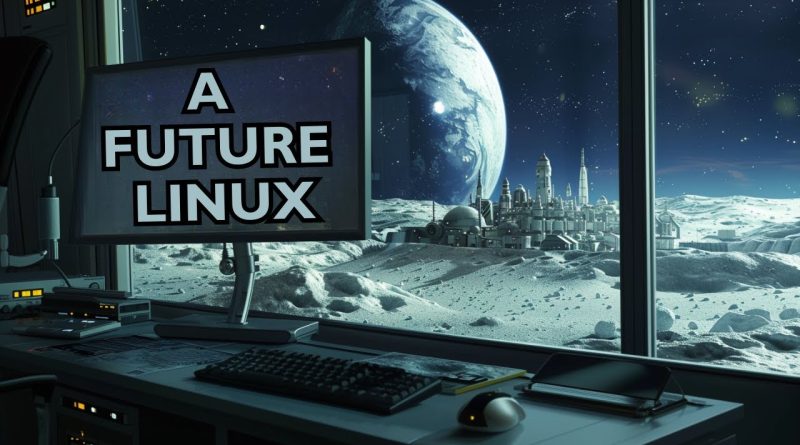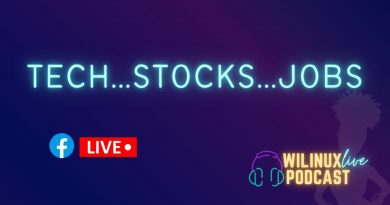Future of Linux: A Visionary Tale from 2024
What will Linux look like in 5, 10, even 15 years from now. Will we still be waiting on the year of the Linux Desktop? Will security be a bigger issue? What about AI? Will our Desktop Environments still be GNOME, KDE, XFCE, MATE, CInnamon, etc.
AI Thumbnail: Off World Linux
00:00 – Introduction
01:20 – Trends in Linux
04:30 – Linux – 5 Years On (2029)
07:16 – Linux: 10 Years On (2034)
10:00 – Linux 15 Years On (2039)
13:34 – Marker 6
16:56 – Conclusions
18:32 – One More Thing…
21:59 – Outro
Support me on Patreon: https://www.patreon.com/DJWare
Follow me:
Twitter @djware55
Facebook:https://www.facebook.com/don.ware.7758
Gitlab: https://gitlab.com/djware27
by DJ Ware
linux foundation




This content feels like it was generated by an LLM.
Linux is fantastic but all of the AI integration that learns and grows with you concerns me a bit, what if the AI can improve your system in ways that are too rapid and you lose the ability to understand those improvements ?, Imagine a feature of the system people would blindly trust to improve the system for them and they pay little to no attention to it one day something goes wrong and AI changes it so much that looking at it is no longer something you can understand let alone manipulate. That fancy AI people are trusting is not on your computer it is on a server and your computer simply has an interface to it.
Do you really want something on a server some where controlling your computer ?, what if the AI is controlled by a government (which is more likely than you think) you no longer have the control or security Linux is known for, Linux wont need any exploits at that point because AI is the exploit that people are openly embracing and giving away control to what ever company or government that controls the AI.
Not a future I would want to embrace, just a passing thought or more like an friggin nightmare steadily becoming a reality.
I predict future Apple hardware blocking Linux , they have already removed boot camp . And Laptops being locked to MS windows due to the financial power behind MS . They won't give up their market share easily
is secure boot being used to force ms windows on to the user ? I have thought of buying a new laptop but It must run Linux , otherwise I just don't want it. I have a 2015 macbook with Linux mint on it . I'm just thinking whats next for me and can I choose Linux with next laptop
2026: Microsoft will finally release their own Alpine commercial version (with support) of Linux adding their ported versions of Excel and Word by using the Avalonia UI that they renamed to AUI.
At some point there will be major assaults by the security state on *nix. I don't mean hacking assaults, I mean legislative assaults.
Personally I donate money to the distro I use. Real currency is useful and as Linux becomes more popular it is likely to become targeted by gov and corporations. Having resources at hand will, I assume, be quite handy at such a time.
With ads directly integrated in windows I'm not worried for Linux
Last distro will be LGBTQLinux
I'm a noob when it comes to Linux. First impression is that varioius groups have been waiting for some "big thing" to be abvailable on Linux. What has kept my from adopting it for so long has been the lack of functional cross-platform compability of productivity software. Complete funcctional replacements for Excel and Word are holding me back now.
as you said, previous decades don't support this time schedule… at all!
👍
Thanks!
DJ has turned into a science fiction writer. I am interested in what Linux will do in the next 3 months, not five years from now.
Years ago, Linux experts and users were saying that you first need to get the proper LINUX BOX, or hardware that is compatible with the Linux OS. We know that Windows will run on almost any hardware, Apple is very restricted only to certain kinds of hardware, and Linux is somewhere in between. Is that right even today?
I wonder if Linux will ever reconsider its adoption of "the Bazaar" in lieu of "the Cathedral." A cathedral-esque approach (like that of the BSDs) seems to have a more disciplined engineering approach. (The code is certainly more legible.)
It's pretty neat to realize that in my 15+ years of software dev experience, at no time was their any real debate on what to use for production systems. Especially now, it's just a given that it will be some flavor of Linux.
The future of Linux on the desktop looks like Ubuntu, Linux Mint and Zorin OS. The neck beard gatekeepers are gonna start dying off and the narcissistic arch boys are simply being ignored. This is great for Linux and the community. Will Linux have more of the desktop market in 15 years? Likely a bit more but its never gonna be "mainstream" unless we get people away from Windows early in their computer using years. Get them away from programs like Microsoft Office and Photoshop and make actual gaming a reality on the Linux desktop. Developers will have to make apps that are capable of competing with apps like final cut pro, photoshop etc. (Yeah I know all about Gimp and resolve. They aren't really options) and vendors will have to support Linux drivers. This means Linux will need to decide what package format they are going go with universally. As of now its WAY too fragmented and snaps suck nuts.
Linux still has a LONG way to go honestly.
For better or worse, I figure Linux' big break will come not so much from within, but from MS royally screwing up Windows. Every new version removes features, puts ads, invades users' privacy more and more while just becoming overall an entirely new OS than what they started with. When the friction becomes that high, people might as well just change to better ecosystem altogether.
Even though I love Lennox, it is in my world limited because there is no speech recognition program available for it, at least none that I know of.
Future? systemd Linux and BSD
Just like Unix will be replaced, Linux will eventually be replaced by other operating systems, but its technology will be passed down.
“Always uncertain the future is”
😃😃😃❤️